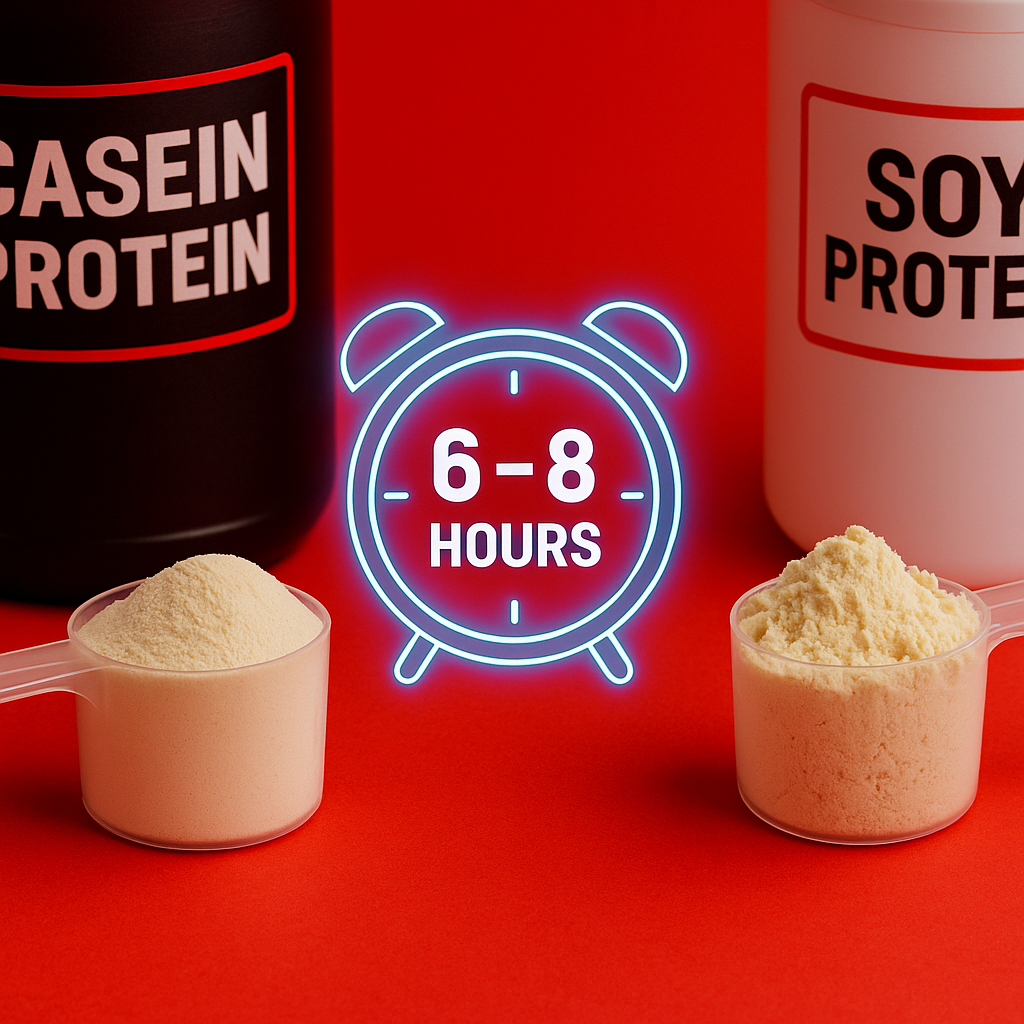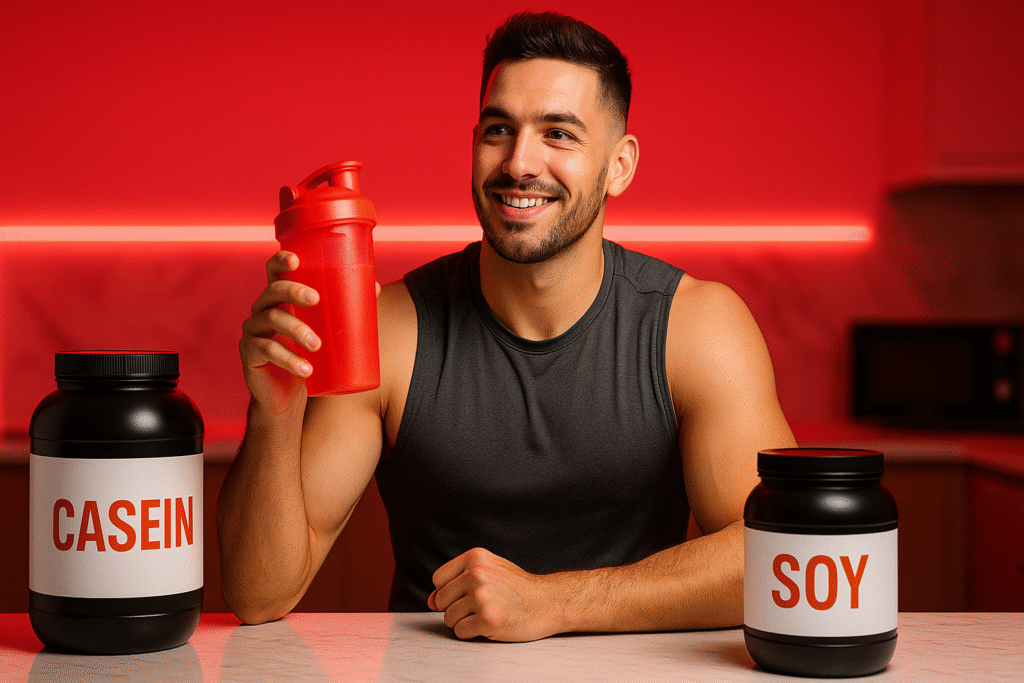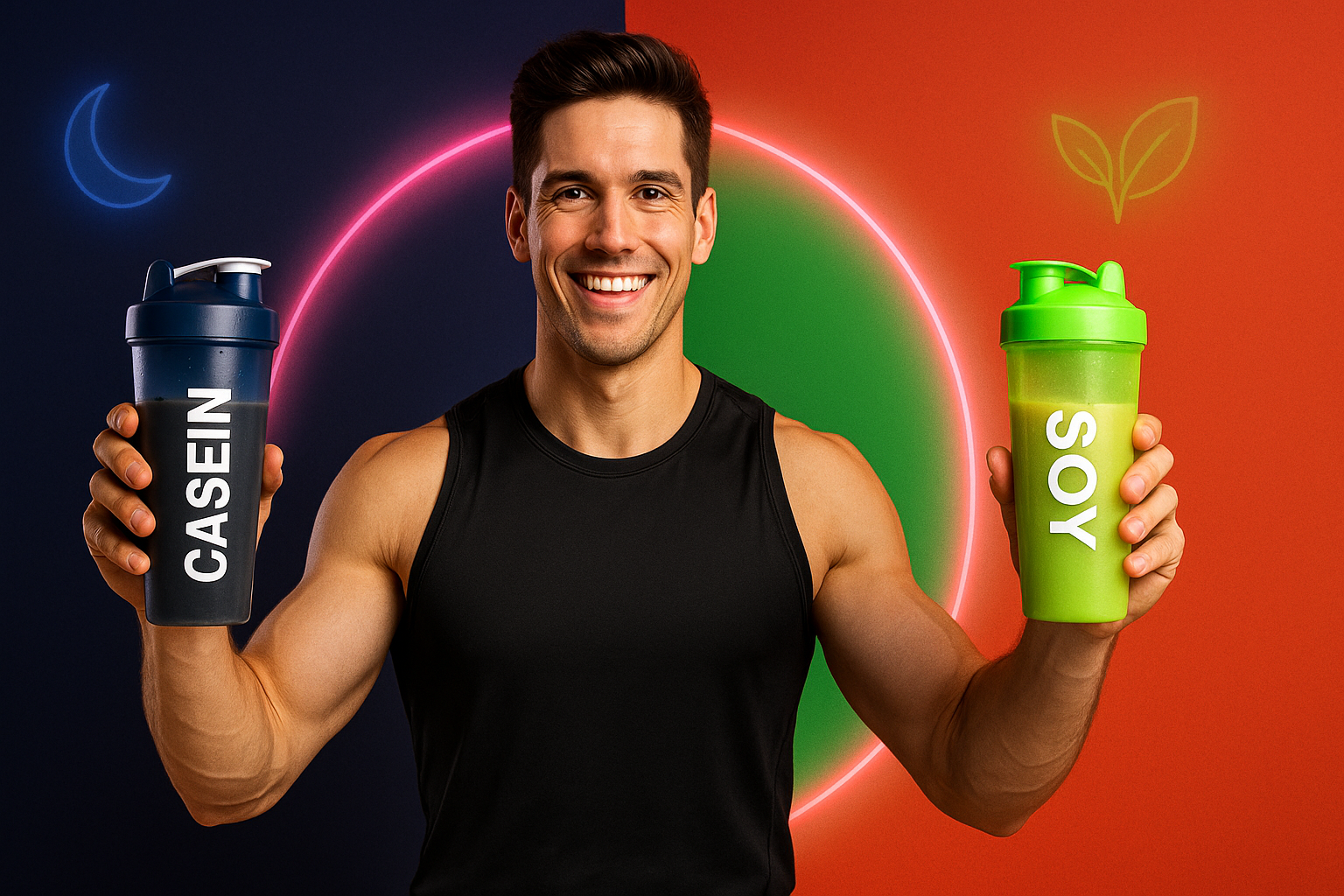If you’ve ever wondered which protein keeps you fueled for hours, casein or soy, you’re not alone.
Slow-digesting proteins are a game-changer for muscle recovery, hunger control, and steady energy—whether you’re cutting, bulking, or maintaining.
In this guide, I’ll break down casein vs soy protein for slow digestion, share real-world results, and help you choose the perfect fit for your goals.
Table of contents
Which is Better for Slow Digestion?
If your goal is long-lasting satiety, overnight recovery, and slow amino acid release, casein protein takes the crown.
It digests more slowly than soy protein, keeping you full for 6–8 hours and steadily feeding your muscles. That makes it an excellent choice for overnight recovery and long fasting windows.
You can learn more about its benefits in my detailed guide on the best time to take casein protein for muscle growth.
Soy protein is still a good option—especially for vegans or those avoiding dairy—but it usually digests faster (about 3–4 hours). This makes it less effective for long fasting periods or overnight muscle preservation.
How Casein Protein Works in the Body

Casein forms a gel-like substance in the stomach, slowing down digestion and providing a steady amino acid supply over several hours.
This makes it ideal for:
- Nighttime muscle recovery
- Long periods without food
- Controlling hunger during calorie deficits
In my own journey, casein has been a game-changer during cutting phases. Back in 2022, when I was leaning out for summer, I’d have a micellar casein shake before bed, sometimes with a spoon of almond butter.
The next morning, I woke up without cravings and with noticeably less muscle soreness. That’s exactly why I often recommend it as a meal replacement option for those wanting slow, steady fuel.
Athletes can also benefit greatly from casein, especially for endurance recovery—a topic I cover in depth in my article on casein for endurance athletes.
How Soy Protein Works in the Body
Soy protein is plant-based and naturally slower to digest than whey, but still faster than casein.
It’s high in essential amino acids, though slightly lower in leucine. This makes it a solid choice for:
- Vegan and vegetarian diets
- People avoiding dairy
- Moderate satiety between meals
I’ve used soy protein during plant-based phases and with vegan clients. While it helped with recovery, hunger tended to return sooner compared to casein.
It’s lighter on the stomach, which is a plus for those who don’t enjoy feeling overly full before bed. But if you want a truly slow-digesting vegan option, I recommend looking into my comparison of casein vs egg protein for nighttime use for other alternatives.
Head-to-Head Comparison for Slow Digestion

Feature | Casein Protein | Soy Protein |
|---|---|---|
Digestion Time | 6–8 hours | 3–4 hours |
Best For | Overnight recovery, fasting, hunger control | Vegan diets, moderate satiety |
Muscle Preservation | Excellent | Good |
Satiety Level | High | Medium |
For example, Daniel from Canada, a client of mine, struggled with late-night snacking during his bulk.
I swapped his evening snack for a casein shake with almond butter, and within weeks, his cravings disappeared. He gained 3 kg of lean mass over 3 months.
On the other hand, María from Spain, a vegan client, used soy protein before bed. She recovered well from workouts but needed to mix in healthy fats like peanut butter to stay full until morning.
Best Use Cases for Each Protein Type
Casein Protein:
- Nighttime recovery
- Long fasting periods
- Cutting phases where hunger control is key
Soy Protein:
- Vegan or dairy-free diets
- Post-workout recovery for plant-based eaters
- Lighter pre-bed snacks without heaviness
If you’re looking for the best bodybuilding-specific casein options, check my guide on top-rated casein protein for bodybuilding.
Final Takeaway – Choosing the Right Protein for Your Goals

From my experience coaching and experimenting with both, casein protein is the top choice for slow digestion and sustained muscle support.
It’s unbeatable for overnight use, fasting, and controlling appetite. You can also see how long it typically takes to notice changes in my article on how long to see results with casein protein.
If you’re vegan or dairy-free, soy protein is still a strong option—just pair it with healthy fats to extend satiety.
And, as always, choose high-quality products:
- Micellar casein for purity
- Non-GMO, third-party-tested soy isolate for safety and performance
When you match the protein type to your lifestyle and goals, you’ll get better recovery, more consistent energy, and fewer cravings—day and night.



Leave a Reply